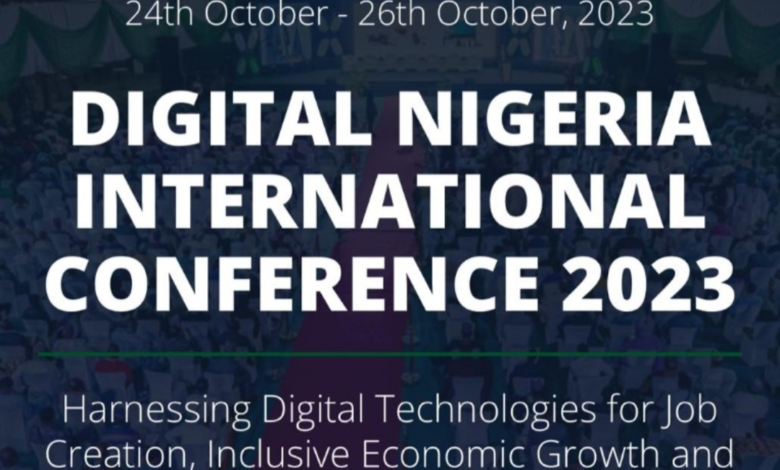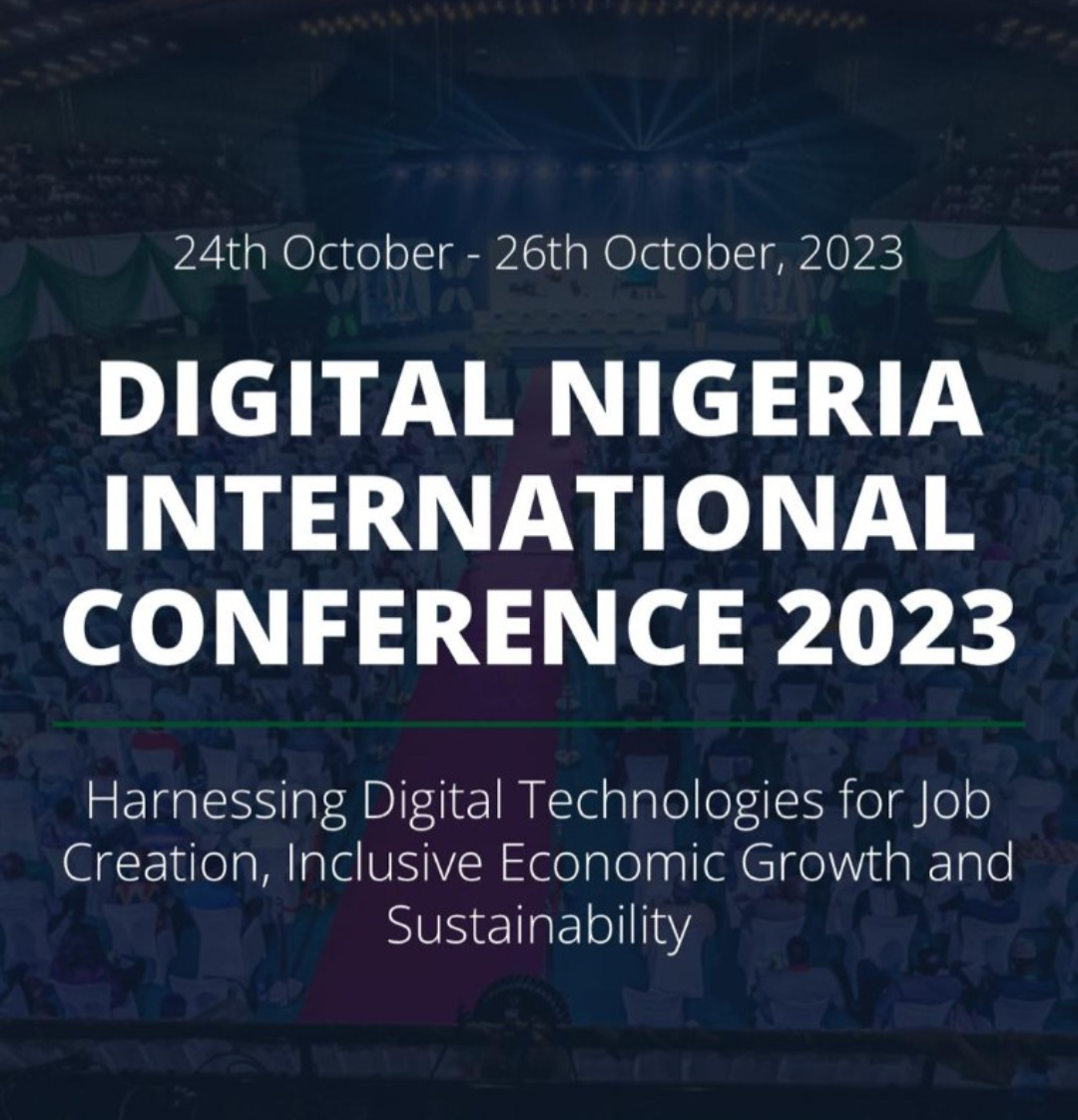Unveiling the Future of Technology: Digital Nigeria International Conference 2023

Unveiling the Future of Technology: Digital Nigeria International Conference 2023
Introduction:
In a world that is continually advancing in terms of technology and innovation, it is imperative for nations to stay at the forefront of these developments. Nigeria, often referred to as the “Giant of Africa,” has recognized this necessity and is making significant strides towards embracing the digital age. The Digital Nigeria International Conference 2023, set to be one of the most significant technology events of the year, will gather thought leaders, innovators, and policymakers to chart a path towards a digital future for the nation. In this blog post, we will delve into the key highlights and insights from this prestigious event.

The Digital Nigeria International Conference 2023:
The Digital Nigeria International Conference 2023, often abbreviated as DNIC 2023, is an annual event that seeks to bring together the brightest minds in technology, innovation, and digital transformation. The conference is a platform for sharing ideas, exploring new possibilities, and discussing strategies to drive Nigeria’s digital transformation forward.
Key Themes and Discussions:
- Digital Infrastructure and Connectivity: To harness the full potential of the digital age, a robust digital infrastructure is essential. Experts at DNIC 2023 are discussing the state of Nigeria’s digital infrastructure and what measures need to be taken to ensure seamless connectivity across the nation.
- Cybersecurity and Data Privacy: As digitalization expands, so do the risks associated with cyber threats and data breaches. The conference features in-depth discussions on how Nigeria can protect its digital assets and ensure the privacy and security of its citizens in an interconnected world.
- Emerging Technologies: Innovations like Artificial Intelligence, Blockchain, and the Internet of Things (IoT) are reshaping industries. At DNIC 2023, delegates explore how these technologies can be harnessed for economic growth and social development in Nigeria.
- Digital Skills and Education: Preparing the workforce for the digital age is critical. The conference addresses the importance of digital literacy and explores strategies to develop a skilled workforce that can contribute to the nation’s digital economy.
- E-Government and Digital Services: Digitizing government services can enhance efficiency and transparency. Experts discuss how Nigeria can leverage e-governance to better serve its citizens and streamline administrative processes.
- Startups and Innovation Ecosystem: Nigeria’s startup scene is booming. DNIC 2023 showcases promising startups and the initiatives aimed at nurturing innovation and entrepreneurship in the country.
Notable Speakers:
DNIC 2023 boasts an impressive lineup of speakers, including government officials, industry leaders, and renowned experts in various technology domains. Some of the notable speakers include:
- Dr. Ngozi Okonjo-Iweala: Director-General of the World Trade Organization and a former Nigerian Finance Minister.
- Dr. Isa Ali Pantami: Nigeria’s Minister of Communications and Digital Economy.
- Amina J. Mohammed: Deputy Secretary-General of the United Nations.
- Industry Leaders: CEOs and founders of leading Nigerian tech companies and startups.
The Road Ahead:
Digital transformation is not just a buzzword; it’s a reality that is reshaping economies and societies across the globe. The Digital Nigeria International Conference 2023 is a testament to Nigeria’s commitment to embracing this transformation and realizing its potential in the digital era.

Building Tomorrow’s World: Digital Infrastructure and Connectivity
Digital infrastructure and connectivity are the lifelines of our modern world. As we increasingly rely on technology for work, education, communication, and entertainment, the need for robust digital infrastructure and connectivity has never been more critical. In this blog post, we will delve into the pivotal role that digital infrastructure and connectivity play in our lives and how they are shaping the future.
Understanding Digital Infrastructure:
Also Read
- Top Universities in Nigeria to Watch in 2024
- Explore the Range of Courses Offered at Federal University Gusau
- List of Courses Offered at Muhammadu Buhari University of Transportation, Daura
- University of Maiduguri Comprehensive List of Courses Offered
- Comprehensive List of Courses Offered at the University of Abuja
- Olabisi Onabanjo University [OOU] List of Courses Offered
- A Comprehensive List of Courses Offered at the National Open University of Nigeria (NOUN)
- The List Of Courses Offered at Maitama Sule University, Kano
- The Comprehensive List Of Courses Offered At Al-Qalam University Katsina
- Umaru Musa Yar’adua University List Of Courses Offered
- Federal University of Health Sciences Azare: List of Courses Offered
- Baba Ahmad University Kano’s List of Courses Offered
- A Comprehensive List of Courses Offered at Bayero University Kano
- List of Courses Offered at Maryam Abacha University Of Nigeria
- A Comprehensive List of Courses Offered at Skyline University Kano and School Fees 2023/2024
- A Comprehensive List of Courses Offered at Azman University Kano
- FULOKOJA Cut Off Marks for 2023/2024 Admission: Complete List for All Courses
- Range of Courses Offered at Al-Istiqama University, Sumaila
- A Comprehensive List of Courses Offered at Nile University
Digital infrastructure encompasses the underlying framework of technology that allows for the smooth functioning of digital services and data transfer. It includes a variety of components, such as:
- Broadband Networks: High-speed internet access is the cornerstone of digital infrastructure. Fiber-optic, cable, and wireless networks connect individuals, businesses, and governments to the digital world.
- Data Centers: These are facilities equipped with powerful servers and storage systems where vast amounts of data are stored, processed, and managed. They enable cloud computing, streaming services, and more.
- Telecommunication Systems: Infrastructure like cell towers and satellites enable voice and data communication, supporting mobile networks and internet connectivity.
- Cybersecurity Systems: These are crucial for protecting digital infrastructure from cyber threats, ensuring data integrity and privacy.
The Importance of Connectivity:
Connectivity refers to the ability to link various devices and systems to share information and resources. It is the bridge that allows individuals, businesses, and governments to access and utilize digital services. Here are a few reasons why connectivity is so vital:
- Economic Growth: Reliable connectivity fuels economic development by enabling e-commerce, online businesses, and remote work. It connects businesses with customers, suppliers, and partners worldwide.
- Education: In the digital age, students need access to online educational resources. Connectivity ensures that learners can access educational content, communicate with teachers, and collaborate on projects.
- Healthcare: Telemedicine and remote monitoring rely on connectivity to provide healthcare services to remote or underserved areas. Patients can consult with doctors and access medical records online.
- Government Services: E-governance and digital services are increasingly becoming the norm. Citizens can pay taxes, apply for permits, and access government information online, saving time and resources.
- Social Connection: Connectivity allows us to stay connected with friends and family through social media, messaging apps, and video calls. It transcends physical boundaries and fosters global communication.
Challenges in Building Digital Infrastructure and Connectivity:
While digital infrastructure and connectivity offer numerous benefits, there are also challenges that need to be addressed:
- Access Disparities: Rural and underserved areas often lack adequate digital infrastructure and connectivity, leading to a digital divide. Bridging this gap is essential for equitable access to opportunities.
- Security Concerns: Cybersecurity threats are on the rise. Protecting digital infrastructure from cyberattacks is an ongoing challenge, requiring constant vigilance and innovation.
- Privacy Issues: The collection and use of personal data in a connected world raise concerns about individual privacy. Regulations and safeguards are necessary to protect user data.
- Environmental Impact: The energy consumption of data centers and digital infrastructure is a growing concern. Sustainable practices and energy-efficient technologies are crucial.
The Future of Digital Infrastructure and Connectivity:
As technology continues to evolve, the future of digital infrastructure and connectivity holds promise and excitement. Here are a few trends to watch:
- 5G Technology: The rollout of 5G networks promises ultra-fast, low-latency connectivity, enabling new applications such as augmented and virtual reality and autonomous vehicles.
- Edge Computing: Edge computing brings processing closer to the data source, reducing latency and enabling real-time applications.
- Satellite Internet: Companies like SpaceX and OneWeb are working on global satellite internet solutions, potentially bringing connectivity to remote areas.
- Digital Inclusion Initiatives: Governments and organizations are increasingly focused on bridging the digital divide, ensuring that everyone has access to the benefits of the digital world.
- Sustainable Practices: Green data centers and sustainable infrastructure are becoming a priority to reduce the environmental impact of digital technology.

Safeguarding the Digital Realm: Cybersecurity and Data Privacy in a Connected World
In an era defined by the rapid proliferation of technology and the extensive sharing of data, the paramount importance of cybersecurity and data privacy cannot be overstated. The digital realm, while offering unparalleled convenience and connectivity, is also fraught with threats. In this blog post, we will explore the intricate and indispensable world of cybersecurity and data privacy.
Understanding Cybersecurity:
Cybersecurity involves the protection of digital systems, networks, and data from unauthorized access, breaches, and cyber threats. It is the practice of safeguarding the confidentiality, integrity, and availability of digital assets. Key elements of cybersecurity include:
- Network Security: Protecting the communication channels that connect devices and systems to prevent data interception or unauthorized access.
- Endpoint Security: Securing individual devices like computers, smartphones, and IoT devices from malware and intrusion.
- Identity and Access Management (IAM): Managing user access and permissions to ensure that only authorized individuals can access certain data or systems.
- Incident Response: Developing strategies and protocols to address security incidents promptly and effectively when they occur.
- Security Awareness and Training: Educating users about cybersecurity best practices to mitigate risks associated with human error.
The Significance of Data Privacy:
Data privacy refers to the protection of personal and sensitive information from unauthorized access, use, or disclosure. In a world where data is constantly generated and shared, preserving data privacy is critical. Here are some key aspects of data privacy:
- Personal Information: Data privacy laws often focus on the protection of personally identifiable information (PII), such as names, addresses, and financial data.
- Consent and Transparency: Individuals must be informed about how their data will be used and provide explicit consent for its use.
- Data Minimization: Companies should only collect and retain data that is necessary for the intended purpose.
- Data Access Rights: Individuals have the right to access their own data and request its deletion or correction.
- Data Encryption: Data should be securely encrypted, both in transit and at rest, to prevent unauthorized access.
Challenges in Cybersecurity and Data Privacy:
As the digital landscape expands, new challenges emerge. Some of the significant challenges include:
- Sophisticated Cyber Threats: Cybercriminals are continually evolving their tactics and techniques, making it challenging to defend against their attacks.
- Compliance with Regulations: Adhering to data privacy regulations like the General Data Protection Regulation (GDPR) and the California Consumer Privacy Act (CCPA) can be complex and costly.
- Human Error: Employees and users can unintentionally compromise security by falling victim to phishing attacks or mishandling data.
- Balancing Convenience and Security: Striking the right balance between user convenience and robust security measures is a constant challenge.

The Future of Cybersecurity and Data Privacy:
The future of cybersecurity and data privacy promises to be both exciting and challenging. Here are some trends to watch:
- Artificial Intelligence (AI) and Machine Learning: These technologies are being used to detect and respond to cyber threats in real-time.
- Zero Trust Security: The zero trust model assumes that threats may exist both inside and outside the network, leading to more robust security measures.
- Privacy-Enhancing Technologies (PETs): These technologies aim to protect privacy while still allowing data to be analyzed and shared securely.
- Global Data Privacy Regulations: More countries are adopting data privacy regulations, making cross-border data handling complex.
- User Education and Awareness: Ongoing user education will be crucial in the battle against cyber threats.







